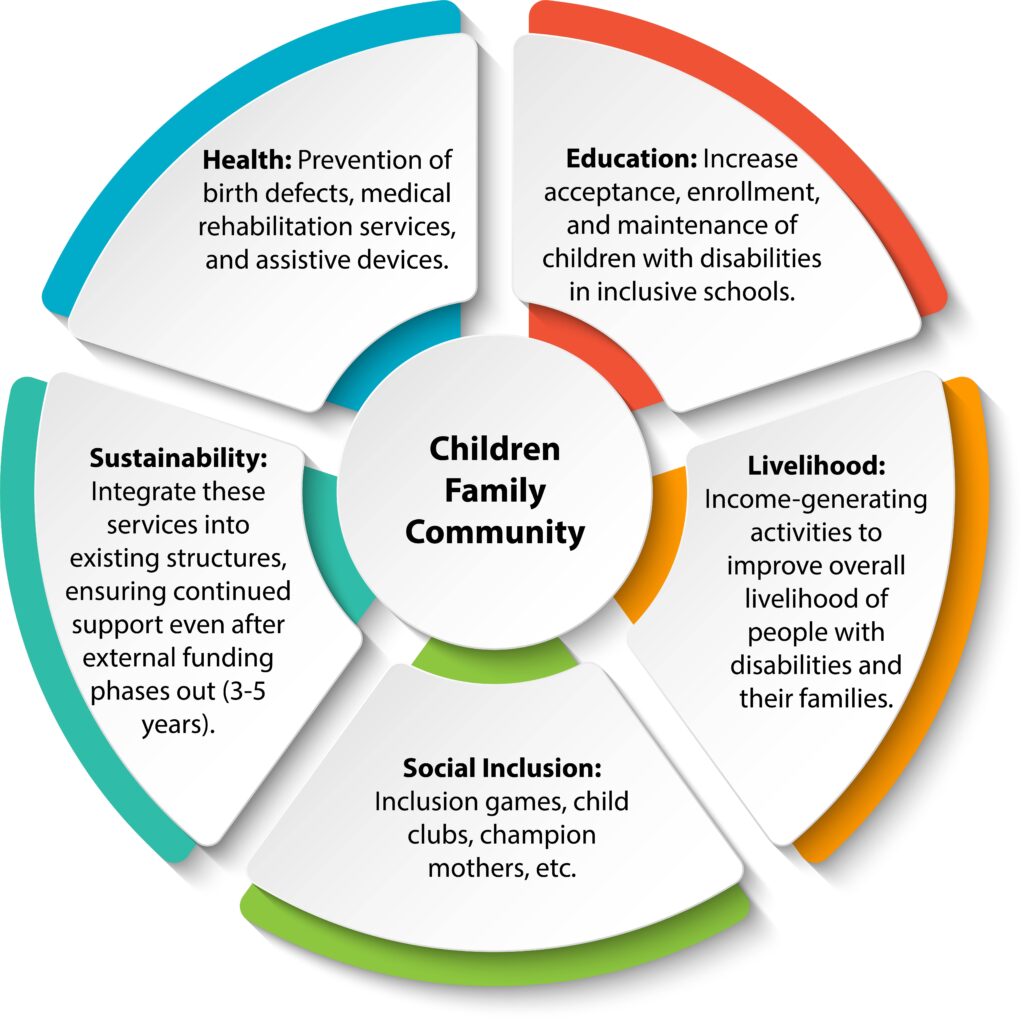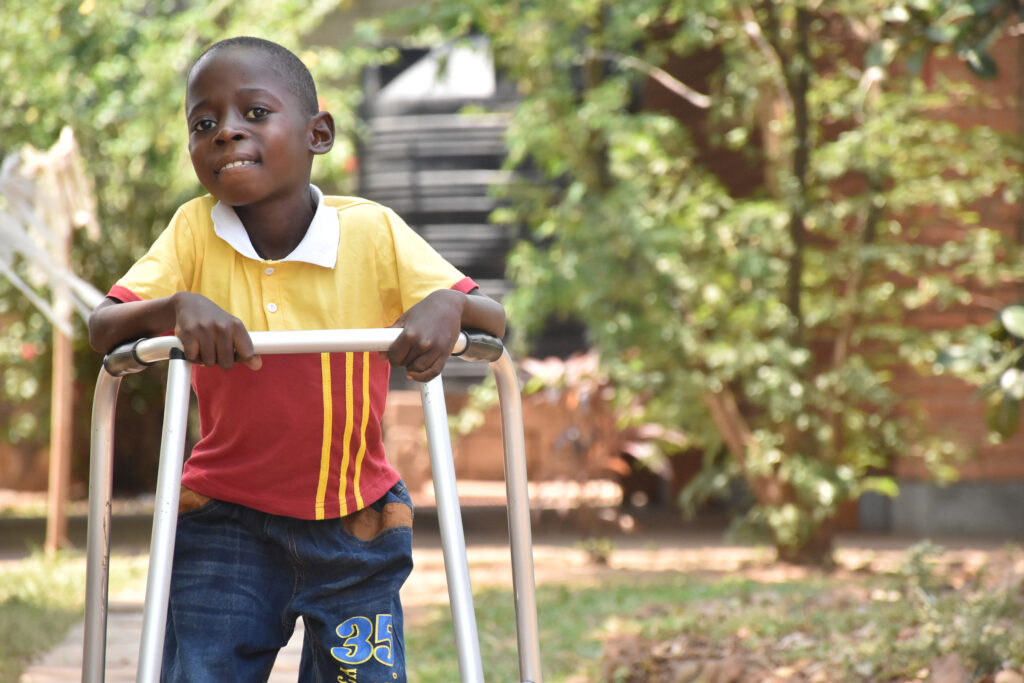Tunafasi means “We all have a place.”
Tunafasi means “We all have a place.”
In 2022, the Democratic Republic of Congo (DRC) passed its first law to promote and protect the rights of people with disabilities, including the right to education, healthcare, and protection from discrimination. However, there are significant challenges in implementation and accessibility, made more complicated because provision of inclusive education and healthcare services is managed primarily by civil society organizations, faith-based institutions, international organizations, and donors.
Children and youth with disabilities in the DRC face critical barriers across key areas, such as health, education, and social inclusion. Many health facilities lack the capacity for early diagnosis, rehabilitation, and specialized care due to inadequate resources and trained staff, leaving these children vulnerable. In education, there are few inclusive schools and trained teachers, limiting access to quality learning. Furthermore, societal stigma and discrimination contribute to their marginalization, while weak policy enforcement and limited government capacity hinder the full inclusion of children with disabilities in public life.
To address these challenges, Appui au Développement de l’Enfant en Détresse (ADED) introduced the Tunafasi program in the Uvira health zone in 2019/2020 and in the Nyiragongo health zone in 2022, with the vision to scale across more than 58 health zones in eastern DRC. Inspired by the Karuna Foundation’s Inspire2Care (I2C) model from Nepal and guided by the WHO community-based rehabilitation (CBR) matrix, Tunafasi aims to integrate rehabilitation and disability prevention into the primary public health package. The program strengthens healthcare, supports inclusive education, and promotes social and economic inclusion for children and youth with disabilities. Through collaboration with the Ministry of Health, health zones, health centers, municipal structures, schools, and communities, the program addresses systemic gaps while combating stigma and empowering families and individuals.
The program contributes directly to Sustainable Development Goals No. 3, 4, 8, 10, 11, and 17. Similarly, focus on the effectiveness of integrating the package of CBR activities into state health structures and other decentralized bodies is in line with the DRC national CBR strategy.
The I2C model places children, family, and communities at the center, focusing on five key areas to build lasting community capacity that will create a brighter future for children with disabilities:

The effectiveness of the CBR model depends on a multi-pronged, integrated systems approach addressing health, prevention, education, livelihood and empowerment, and socialization and protection. CBR policies, agreements, and structures enabled collaboration and coordination efforts, facilitating smoother integration of CBR into the health system. This included CBR information and data incorporated into the National Health Information System. Twenty-two community engagement facilitators were recruited based upon their skills and background to enhance community engagement and ensure a more effective delivery of CBR services.
The Muunganzo Tegemeza Network was developed to foster better coordination among existing disability-focused organizations and provide well-coordinated and complementary disability rehabilitation services, thus minimizing duplication of efforts. In addition, partnerships with organizations such as ICRC, Humanity & Inclusion, and specialized centers (e.g., Bethany and SOSAME – friend of charity for mental health) were forged to enhance capacity building and provide specialized medical care, assistive devices, and vocational training, thereby improving the overall quality and accessibility of services for persons with disabilities. A partnership with Ajepad enabled implementation of the Tunafasi program in the city and rural area of Baraka, South Kivu.
ADED is a leader in fostering global collaboration for disability inclusion. As one of the founding members of a South-South alliance, organizations across Asia and Africa connect with it to share best practices and experiences and to collaborate on initiatives that improve the lives of people with disabilities worldwide. ADED received the Zero Project Scaling Solutions Award in Vienna for its innovative inclusive education program under the Tunafasi initiative, positioning it as a leader in promoting disability inclusion on a global scale.
Born in Uvira on October 20, 2014, Balemba is the second child of Balemba Felix and Tumaini Mugosa, residents of the Kasenga neighborhood of Uvira city. He was born without a disability. However, when he was 4 months old, he presented with a severe fever. His mother took him to different health centers but his health continued to decline, which affected his growth. His poor health affected his psychomotor development to the extent that he couldn’t walk. Eventually, Balemba’s father left the family because of Balemba’s disability and his mother struggled alone to find treatment for her child.
 The mother learned through the Tunafasi community facilitator that ADED supports people with disabilities and she joined a Tunafasi self-help group. In 2023, Balemba was selected to receive special care and was transferred to Clinique Medico Chirurgicale Chretienne (CMCC) in Burundi. He received surgery for his diagnosed “osteo-arthritis with necrosis of the bilateral femoral head and acetabular lysis in a context of sickle cell disease,” medical treatment, and physiotherapy. He now can stand up alone and walk with the help of crutches.
The mother learned through the Tunafasi community facilitator that ADED supports people with disabilities and she joined a Tunafasi self-help group. In 2023, Balemba was selected to receive special care and was transferred to Clinique Medico Chirurgicale Chretienne (CMCC) in Burundi. He received surgery for his diagnosed “osteo-arthritis with necrosis of the bilateral femoral head and acetabular lysis in a context of sickle cell disease,” medical treatment, and physiotherapy. He now can stand up alone and walk with the help of crutches.
Balemba recently started attending school. His dream is to become a doctor, like the ADED staff doctor, Dr. Umubyeyi Beatrice, who accompanied him to Bujumbura for the surgical treatment. He wants to take care of children with disabilities. Currently, Balemba is happy, as he now can play with other children.
Significant progress has been made in all five areas of the Tunafasi I2C Framework, with the following examples of measurable impact:
Email Us to Learn More or Get Involved With This Work
Gilbert Mututsi Ruturutsa is a dedicated Congolese development leader with over 30 years of experience in project management, rural development, and community-based rehabilitation. Since 2000, Gilbert has served as the National Director of ADED, a Congolese nonprofit focused on uplifting vulnerable populations, particularly persons with disabilities (PwDs). Passionate about inclusive development, Gilbert launched a pioneering program to integrate community-based rehabilitation (CBR) into state structures, advocating for the rights and inclusion of children and youth with disabilities (CYWDs). Under his leadership, ADED has supported over 1,500 children with disabilities since 2019, providing education, rehabilitation, and livelihood opportunities that foster independence and community integration. Gilbert holds a master’s degree in project management from Louvain la Neuve, Belgium, and is recognized for his strategic planning, financial management, and extensive training in CBR, results-based management, and participatory community development.
Joachim Wilondja is a Program Manager at ADED with 12 years of experience in development and humanitarian projects, including 5 years specializing in the integration of community-based rehabilitation (CBR) within the DRC’s health system. As Program Manager at ADED-DR Congo, Joachim leads CBR initiatives through meticulous strategic planning, risk management, team supervision, and proactive stakeholder engagement. His responsibilities include facilitating steering committees, refining project methodologies, managing budgets, and overseeing program outcomes to maintain and elevate quality standards across all activities. Joachim’s expertise spans comprehensive project and program management, MEAL (Monitoring, Evaluation, Accountability, and Learning) system development, and environmental project oversight. Known for his creativity in problem-solving, he brings a successful track record in fundraising and project proposal writing to further advance program goals. He holds a bachelor’s degree in agricultural engineering from IFA Yangambi in DR Congo and a Diploma in Biology and Chemistry from Institut de la Fraternité in Tanzania, underpinning his commitment to impactful and sustainable development.
Erick Mujanama is an accomplished expert in inclusion and sustainable development with a master’s degree in environmental and development studies and a bachelor’s degree in economics. With a strong foundation in community-based rehabilitation, Erick serves as Project Manager for the Tunafasi program at ADED, leading initiatives that empower persons with disabilities (PwDs) through comprehensive support in health, education, livelihoods, social integration, and empowerment. His work is deeply committed to advancing inclusive development and environmental sustainability. As a certified environmental expert, Erick is passionate about creating equitable access to education, economic empowerment, and sustainable livelihoods for marginalized communities. An advocate for impactful and inclusive solutions, he leverages his expertise to address social and environmental challenges with a lasting impact. Erick is also a published author and co-author of three academic articles on integrated development.